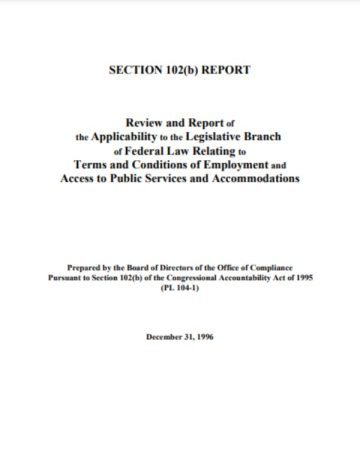Section 102(a) of the Congressional Accountability Act (CAA) lists the eleven laws that “shall apply, as prescribed by this Act, to the legislative branch of the Federal Government.” Section 102(b) directs the Board of Directors (Board) of the Office of Compliance to:
review provisions of Federal law (including regulations) relating to (A) the terms and conditions of employment (including hiring, promotion, demotion, termination, salary, wages, overtime compensation, benefits, work assignments or reassignments, grievance and disciplinary procedures, protection from discrimination in personnel actions, occupational health and safety, and family and medical and other leave) of employees, and (B) access to public services and accommodations.
And, on the basis of this review,
[b]eginning on December 31, 1996, and every 2 years thereafter, the Board shall report on (A) whether or to what degree the provisions described in paragraph (1) are applicable or inapplicable to the legislative branch, and (B) with respect to provisions inapplicable to the legislative branch, whether such provisions should be made applicable to the legislative branch.
In preparing this report, the Board has reviewed the entire United States Code to identify those laws and associated regulations of general application that relate to terms and conditions of employment or access to public accommodations and services. In other words, the Board has reviewed those provisions of law that confer employment rights or benefits on or affect workplace conditions of employees, and that create a corresponding mandate for employers, or that relate to access to public services or accommodations. The Board excluded from consideration those laws that, although employment-related, (1) are specific to narrow or specialized industries or types of employment not found in the legislative branch (e.g., employment in maritime or mining industries, or the armed forces, or employment in a project funded by federal grants or contracts); or (2) establish government programs of research, data-collection, advocacy, or training, but do not establish correlative rights and responsibilities for employees and employers (e.g., statutes authorizing the Women’s Bureau or the Bureau of Labor Statistics); or (3) authorize, but do not require, that employers provide benefits to employees, (e.g. so-called “cafeteria plans” authorized by 26 U.S.C. 125).
